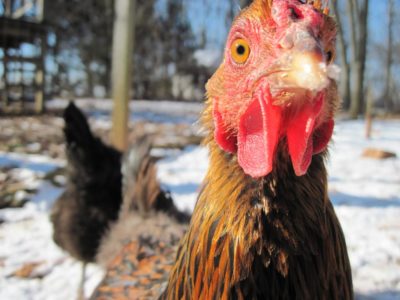New Year’s resolutions are a funny thing. More than half of the American population make them yet only 8 percent of those people will actually achieve their resolution. Think about past resolutions you may have made. Did you actually achieve your goal? Chances are you probably didn’t.
There are many reasons why people fail on achieving their New Year’s resolutions, but it all boils down to one thing: They didn’t set themselves up for success in their goal-setting tactic. Successful goal-setting isn’t as simple as declaring a goal and leaving it at that.
Think again about your homestead. Was there some goal you had last year (even if it wasn’t a New Year’s resolution) that never came to be? Maybe it was something as simple as extending your garden or more time-intensive like building a new chicken coop. Looking back, it’s likely you had plenty of time and resources to complete the goal but it just never happened for one reason or another. You can prevent this from happening in 2015 by formatting your goals the S.M.A.R.T way.
S.M.A.R.T Goals
The S.M.A.R.T method is one of the most fool-proof and effective ways of setting up achievable goals. The acronym stands for Specific, Measurable, Attainable, Realistic and Timely. Once you have a general idea of what goal you ultimately want to achieve, you will reformat it by following each section.
S – Specific: Most goals lack specificity. To make a goal as specific as possible you will need to figure out:
- Who is involved
- What the goal will accomplish
- Where it needs to be done
- When it needs to be completed
- What is the purpose of the goal
Don’t worry if all of these don’t apply to your particular goal. You just want to figure out why the goal is important (what purpose it serves) and get the goal as specific as possible for the following sections.
M – Measurable: Being able to measure a goal is important but often completely skipped. Once you have specified your goal, you need to figure out how your results will be measured. This step is pretty easy but important nonetheless. Only a goal capable of being measured will be achievable.
A – Attainable: There is nothing wrong with having lofty goals for your homestead, but losing sight of what is achievable will spell disaster. Attainability can be judged by a few criteria, such as:
- Financial ability
- Skill ability
- Property ability
Lofty goals can be extremely rewarding, but you must be certain you have the material capacity to actually achieve them.
R – Realistic: Similar to choosing an attainable goal is a realistic one. As stated before, lofty goals are fine but only if you have the ability to achieve them. As for being realistic, can YOU actually achieve the goal for your homestead? You might have the skill (or access to skilled workers or what have you have), the money and the space, but do you have the drive and motivation to achieve it?
T – Timely: Once you have a specific, attainable goal, you need to break it down into some sort of time frame or steps you can follow. Rather than having one large goal, break it down into mini-goals with reasonable time frames. Time frames are important for both judging where you are, in achieving your ultimate goal, and also to keep up your motivation.
S.M.A.R.T Goal Examples for the Homestead
Here is just one example of how you can set up a goal for your homestead using the above method.
Goal: Add laying hens to property
In this example, the person is new to self-sufficiency but has decided she would like to get some laying hens to provide eggs for the family. She knows a little about chickens but has no existing coop or run.
Now, let’s break it down.
Specific
She needs to ask several questions about this goal:
- Who will be involved: She will be primary caretaker and her husband will help with building the coop.
- What needs to be done: Determine what types of chickens to get. Research chicken care and necessary supplies. Find or develop coop and run blueprints.
- When does it need to be done by: Within 1 month.
- Where will it be done: On their property by the house.
- Why will it be done: To further improve their self-sufficiency while also adding a fun and versatile livestock to their land.
Measurable
This goal will be measured by completion of research, the building of a suitable coop and run, and finally adding laying hens within 1 month.
World’s Smallest Solar Generator … Priced So Low Anyone Can Afford It!
Attainable
Now, ensure the goal is attainable.
- Skill Ability: Keeping a small, healthy flock of chickens is within her skill limit. Building a coop and run is also within her and her husband’s skill limits.
- Financial Ability: They have allotted $500 to build any necessary structures and buy young laying hens as well as supplies.
- Property Ability: Their property is big enough to provide enough space for a small flock, with room for expansion. They do not live within city limits so they won’t need permits for keeping hens.
Realistic
They both are very interested in chickens and understand the work involved with keeping a flock. Adding a few hens is completely realistic.
Timely
She has decided to break down her goal into seven steps to be completed in 4 weeks:
Week 1
- Research chicken breeds as well as chicken care. Ask local chicken keepers what breeds they recommend for the area. Invest in a few chicken books to have on hand.
- Research types of chicken coops that work in their region and review final plan with husband.
Week 2 & 3
- Find and mark a level location for coop and run on their property.
- Purchase all building supplies and lumber as well as chicken supplies like feeders and waterers.
- Build the coop and run.
- Add furnishings like perches and nest boxes. Also, set up feeders and all other supplies. Buy chicken feed.
Week 4
- Locate and purchase a small group of healthy, young laying hens. Introduce to coop and allow them to settle.
She now has a more specific goal as well as a timeline she and her husband can follow to ensure they achieve their four-week timeframe for adding chickens to their property.
It might seem like it takes a long time to set up a goal using the S.M.A.R.T method, but it really isn’t difficult. And, in the long run, it sets you up for success and also helps you work toward multiple goals while giving proper attention to each individual project.
What are your 2015 goals for your property? Feel free to share them in the comment section below:
 Off The Grid News Better Ideas For Off The Grid Living
Off The Grid News Better Ideas For Off The Grid Living






